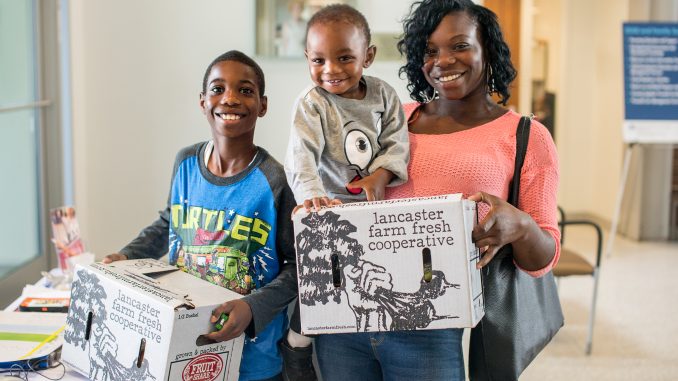
Victoria Vicente remembers a story about a boy from North Philadelphia seeing a banana for the first time. He picked it up and took a bite, without even bothering to peel it, she said.
This story is one that sticks with Vicente, and it’s why she thinks programs that help provide fresh produce are necessary in North Philadelphia, which lacks easy access to the food group.
Vicente, the associate director of annual campaigns for Temple Health, helped raise funds for Farm to Families, one of the school’s programs to teach healthy eating to North Philadelphia residents.
St. Christopher’s Foundation for Children started Farm to Families in 2010, and partnered with TUH in May. The fundraising campaign started last month. Although the program is primarily for people struggling to afford food, Jamiliyah Foster, the program director for the foundation, said, “anyone who wants a fresh box of produce is welcome to it.”

“One of the most important parts of our program is that we’re not income-based, in order to maintain dignity for our clients,” Foster said. “It’s important for patients to see their own doctors or nurses buying a box of produce alongside them.”
The Lancaster Farm Fresh Cooperative packages and delivers produce to TUH and several other community hubs so families can buy affordable, organically grown produce.
As part of the program, physicians at TUH can prescribe patients with coupons to purchase produce from Farm to Families on a weekly basis.
The doctors give the prescription to patients after asking a series of questions to determine if they have sufficient access to healthy foods. The box of produce also comes with information about the health benefits of fruits and vegetables and the opportunity to observe cooking demonstrations and participate in taste-testing.
Ashleigh Hall, a pediatrician at TUH and a professor of clinical pediatrics, is one of many physicians who writes prescriptions so that her patients can receive the packages.
“Diet and exercise plays a huge role in how healthy we are,” Hall said. “We’re finding that this is important for children because they need healthy food for their brain to grow. … If we can keep kids healthy at the beginning, then maybe we can prevent them from having health problems later down the road.”
TUH also participates in the four-year Good Food, Healthy Hospitals initiative, which is designed to bring healthier options to Philadelphia hospitals and develop nutritional standards for patients’ meals.
In September, the city’s public health department announced that TUH was the first hospital in Philadelphia to complete the basic requirements for the program. The hospital now offers more vegetarian options, along with beverages and desserts that are low in sugar and sodium.
Catherine Bartoli, a 2005 master’s of urban studies alumna, is the healthy food procurement coordinator for the department.
“Temple has been really well-engaged and they are continuously working toward achieving more guidelines,” Bartoli said. “It is a continuous process, so we’re still working with them to achieve more guidelines and further standards. We try to really enhance the work they’ve already done.”
Bartoli said she thinks ensuring overall health equity is important, especially in North Philadelphia. According to the Center for Disease Control, nearly 70 percent of kids living in North Philadelphia are overweight or obese.
“In the realm of nutrition, I look at food as being really fundamental to our health and wellbeing,” she said.
Patients are not the only ones encouraged by TUH to treat food as medicine. Maureen Fitzgerald, food editor at the Inquirer, teaches cooking classes to medical students at the Lewis Katz School of Medicine.
The classes are an extension of My Daughter’s Kitchen, an eight-week, after-school cooking program that Fitzgerald started with the Vetri Community Partnership, a non-profit that encourages healthy eating in Philadelphia with several programs.
Fitzgerald’s cooking classes at the Lewis Katz School of Medicine began earlier this semester. So far, Fitzgerald said she has noticed her students becoming “more comfortable in the kitchen.”
David Pioquinto, one of five students taking Fitzgerald’s cooking class, said he’s always struggled to eat healthy. But the cooking classes have shown him how easy it is to make healthy recipes at home.
“Before taking the class I would have thought it too difficult and time consuming to cook a holistic meal that is filling and healthy,” Pioquinto added. “Now I am more inclined to cook these meals on my own.”
Meghan Costa can be reached at meghan.caroline.costa@temple.edu.
CORRECTION: In the print version of this article, it stated that Victoria Vicente’s position was the associate director for annual giving and special campaigns for Temple Health, when her position is the associate director of annual campaigns. It also stated that the partnership between Temple Health and Farm to Families began last month, when it began in May.



Be the first to comment